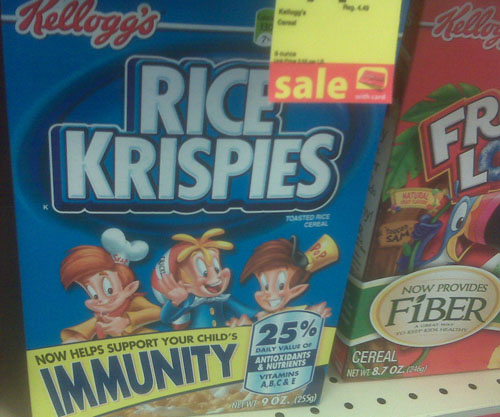Update: Kellogg’s False Health Claims on Rice Krispies and Frosted Mini-Wheats Earn FTC Rebuke
When Good Brands Behave Unethically
Back in February, I pointed out Kellogg’s false health claims on Rice Krispies and Froot Loops. Specifically, during the worst flu scare in 50 years, Kellogg’s claimed Rice Krispies boosted immunity. They also claimed that Froot Loops were a good source of fiber.
This was something I saw in the grocery store, and as a marketer and parent, I found the ad so offensively false that it deserved any ridicule I could muster. So, a cell-phone photo later, I filed my blog post. Happily, both my readers commented and joined in. Thanks for that!
Clinically Shown to be 20% Better Than Nothing
Coverage on NPR’s Marketplace focused on additional bad advertising by Kellogg’s: a claim that Frosted Mini-Wheats are clinically shown to improve kids’ attentiveness by 20 percent. The study compared kids who ate Kellogg’s Frosted Mini-Wheats to a control group who got a breakfast of only water. Perhaps a fairer claim would be have been 20% better than nothing.
This is an intellectual sucker punch. And it is a lie to parents by a brand that claims to care about nutrition and families. It is also a sign that something’s gone wrong in Kellogg’s marketing machine.
Marketers and Parents Should Call This What it Is
Advertising law may have allowed this, but it doesn’t make it true or ethical. And the product managers and attorneys at Kellogg’s should have known and acted better, both as brand stewards and as thoughtful citizens.
The Federal Trade Commission investigated Kellogg’s, and gained their agreement to stop such claims, but without requiring the company to admit the claims were false.
Kellogg’s Rice Krispies and Fruit Loops Aspire to Pharma Aisle

Fruit or Froot?
Does Rice Krispies really help my child’s immunity more than, say, fresh fruit? And though Froot Loops now provides fiber, isn’t it still loaded with crap that most adults wouldn’t intentionally feed to their kids? What’s a better source of fiber: “Fruit” or “Froot”? Go ahead, pick any froot.
Its good that the FTC called them out, but Kellogg’s response has been focused on regulators, not on setting things right with families or promising to do better.
The brand should take responsibility for its misstep and use this experience as an opportunity to improve. And parents and marketers should expect nothing less. Without an apology, the brand seems to be dodging, rather than leveling with, its audience.

 The future of digital experiences will be built by strategists who grasp the full array of emerging business, social, and technical models. Specialties in user experience, branding, application design, and data science are laying the foundation for richer user experiences and business models breakthrough products and revenue based marketing.
The future of digital experiences will be built by strategists who grasp the full array of emerging business, social, and technical models. Specialties in user experience, branding, application design, and data science are laying the foundation for richer user experiences and business models breakthrough products and revenue based marketing.